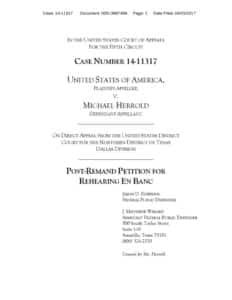Fifth Circuit To Decide If Texas Burglary Qualifies For ACCA Enhancement
The entire Fifth Circuit Court of Appeals has agreed to decide whether Texas burglary of a habitation under Texas Penal Code 30.02(a)(1) is equivalent to “generic burglary” under the Armed Career Criminal Act (ACCA). See, United States v. Herrold, No. 14-11317 (5th Cir. 2017). The court’s decision to rehear Herrold comes on the heels of the Sixth Circuit’s en banc decision in United States v. Stitt, No. 14-6158 which held that a conviction under Tennessee’s aggravated burglary statute is not a crime of violence.
The ACCA requires enhanced penalties for individuals with three prior qualifying convictions. 18 U.S.C. 924(e). One way for a prior conviction to qualify is if it is an “enumerated offense.” 18 U.S.C. 924(e)(2)(B)(ii). Burglary is such an offense.
But long ago the Supreme Court in Taylor v. United States held that “burglary” under the ACCA means “an unlawful or unprivileged entry into, or remaining in, a building or other structure, with intent to commit a crime.” This is known in the law as “generic burglary.”
States often define the crime of burglary differently. In Tennessee, for instance, “aggravated burglary” under Stitt is not “generic burglary” because it covers the breaking and entering of “‘mobile homes, trailers, and tents’ as well as any ‘self-propelled vehicle.'”
The Texas burglary statute is similarly overbroad. Texas burglary defines “habitation” as including vehicles “adapted for the overnight accommodation of persons.” Texas Penal Code 30.01(1). But the Supreme Court has never considered the breaking and entering of vehicles, even if adapted for habitation, as the same as “generic burglary.”
The en banc Fifth Circuit will now decide this question. In addition, the Fifth Circuit has been asked in Herrold to overrule its prior decision in United States v. Uribe on the basis that Uribe failed to properly apply the Supreme Court’s decision in Mathis v. United States. Herrold argued in his en banc petition that Uribe improperly treats Texas burglary convictions under TexasPenal Code 30.02(a)(1) as a divisible offense.
A favorable decision for the defendant in Herrold could impact long ACCA sentences. A positive decision in Herrold may also affect individuals who received a career offender enhancement based on a Texas burglary prior.
The en banc petition in Herrold can be accessed here: Herrold en banc petition. The Government’s response to the petition is here: USA response to Herrold en banc petition.
Stay tuned! Texas Burglary | Generic Burglary |ACCA Enhancement
Recommended for you
Ex Parte Communications By Judge With Jury Required Reversal Of Convictions
At Martin Bradley III’s trial for racketeering, mail fraud, wire fraud, and money laundering, the district court had two ex parte communications with the jury. Bradley’s defense lawyers did not become aware of notes until after his appeal. Bradley filed a 2255 motion arguing, in addition to other things, that the court had violated Rule…
Drug Treatment And Vocational Training Improper Sentencing Considerations
Christopher Thornton moved for a downward variance at sentencing arguing, among other things, that “in-prison treatment during the proposed thirty-eight months would help mitigate any potential risk he posed to the community.” The district court denied the motion, but in doing so said that Thornton had “mental-health issues, and he needs drug treatment” and that…
Amendment 782 Motion Reconsideration
Reinaldo Rivera moved for 18 U.S.C. § 3582(c)(2) relief based on Amendment 782 to the Guidelines, commonly known as “drugs minus 2.” The district court granted the motion and reduced his sentence to 420 months from LIFE. But in doing so, the district court believed Rivera’s mandatory minimum was 30 years for his CCE conviction.…





